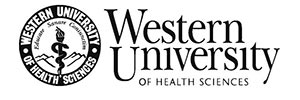Western University of Health Sciences Online DNP and Certificate Programs – FNP, PMHNP, ENP
What to Expect from Western University of Health Sciences Online NP Programs
Admission Requirements: Applicants to the DNP program should have a bachelor of science or master of science in nursing degree from a board approved program. Applicants with bachelor’s or master’s degrees in related fields are considered on a case-by-case basis.
Applicants must have maintained a GPA of at least 3.0 overall and also within their last 60 semester or 90 quarter units. Applicants must submit an application, provide proof of an active, unencumbered Registered Nurse (RN) license in the state where they obtain practice hours, have at least one year (at least 1800 hours) of experience as a Registered Nurse (RN) and submit two references. Applicants lacking one year (at least 1,800 hours) of experience as an RN can still qualify for this program but will be given a modified curriculum. Applicants lacking RN experience must complete the 1,800 hours of RN employment by the end of their first year in the program. Finally, students must also have completed a statistics course (two semester units or three quarter units) with a grade of “C” or higher.
Certificate program students submit an online application, a curriculum vitae, a personal statement, one reference, proof of their RN license, any advanced practice certifications, and official transcripts from all schools attended. Any applicants who have completed coursework outside the USA must get their coursework evaluated by either Josef Silny & Associates or World Education Services.
International students are welcome to apply. International applicants must submit any coursework taken from non-US educational institutions to an approved evaluation service, proof of legal US residency (before matriculation), and proof of English language proficiency if necessary.
State Restrictions: Western University of Health Sciences is authorized to offer its nursing programs in Alaska, Arizona, California, Colorado, Idaho, Nevada, New York, North Dakota, Oregon, Texas, Utah, and Washington. Students outside of California should verify with the College of Graduate Nursing and their state licensing board to verify eligibility and ensure that the program meets state requirements for NP licensure.
Study Plan: The DNP program can be completed in approximately three years. Full-time students can complete the FNP certificate in six semesters in two years and the PMHNP certificate in four semesters in as little as sixteen months. The 12 credit ENP certificate can be completed in two semesters in less than 12 months.
DNP-FNP Curriculum: Students entering the program with one year of RN experience complete a 78-credit-hour curriculum consisting of the following courses: advanced pharmacology; advanced physical assessment; advanced pathophysiology; scholarly writing; primary care I: management of common conditions across the lifespan; FNP role: health promotion and disease prevention; clinical applications I; reflective practice and professional identity formation in advanced practice nursing; primary care II: management of acute conditions across the lifespan; societal and ethical issues for the nurse practitioner; clinical applications II; FNP-clinical comprehensive evaluation I; addressing diversity, equity, and inclusion in healthcare; primary care III: management of chronic conditions across the lifespan; advance practice inquiry; applied biostatistics for health professionals; primary care IV: management of complex conditions across the lifespan; complementary pharmacology and alternative therapies; theoretical perspectives for nursing practice; organizational leadership, collaboration, and the science of improvement; clinical applications III; FNP-clinical comprehensive evaluation II; health informatics and outcome driven practice; assessment, measurement, and evaluation in outcomes-based advanced nursing practice; population health; DNP systems thinking I: developing the scholarly project; social justice, health policy, and advocacy in practice; FNP outcome competencies review; professional practice issues; DNP systems thinking II: implementing the scholarly project; FNP-clinical comprehensive evaluation III; business and management practice for the nurse practitioner; and DNP systems thinking III: evaluation and dissemination of the scholarly project.
In addition, students complete a two-credit hour FNP clinical experience every semester beginning in their second semester. Students lacking one year of RN experience should consult the WHSU website for curriculum details.
DNP-PMHNP Curriculum: Students entering the program with one year of RN experience complete a 71-credit-hour curriculum consisting of the following courses: advanced pharmacology; advanced physical assessment; advanced pathophysiology; scholarly writing; psychopharmacology; psychiatric-mental health care management across settings I; reflective practice and professional identity formation in advanced practice nursing; PMHNP clinical evaluations I; addressing diversity, equity, and inclusion in healthcare; counseling and diagnostic reasoning across the lifespan; advance practice inquiry; applied biostatistics for health professionals; psychiatric-mental health care management across settings II; theoretical perspectives for nursing practice; organizational leadership, collaboration, and the science of improvement; PMHNP clinical evaluations ii; health informatics and outcome driven practice; assessment, measurement, and evaluation in outcomes-based advanced nursing practice; population health; DNP systems thinking I: developing the scholarly project; social justice, health policy, and advocacy in practice; psychiatric-mental health care management across settings III; DNP systems thinking II: implementing the scholarly project; PMHNP clinical evaluations III; and DNP systems thinking III: evaluation and dissemination of the scholarly project.
In addition, students complete a two-credit FNP clinical experience every semester beginning in their second semester. Students lacking one year of RN experience should consult the WHSU website for curriculum details.
Post-master’s Certificate Curriculum
FNP Certificate: Students complete 47 credits in areas including advanced pharmacology; advanced physical assessment; advanced pathophysiology; primary care i: management of common conditions across the lifespan; FNP role: health promotion and disease prevention; clinical applications I; primary care II: management of acute conditions across the lifespan; societal and ethical issues for the nurse practitioner; clinical applications II; FNP-clinical comprehensive evaluation I; primary care III: management of chronic conditions across the lifespan; business and management practice for the nurse practitioner; primary care IV: management of complex conditions across the lifespan; complementary pharmacology and alternative therapies; FNP outcome competencies review; professional practice issues; clinical applications III; and FNP-clinical comprehensive evaluation II.
In addition, students complete a two-credit FNP clinical experience every semester beginning in their second semester.
PMHNP Certificate: Students complete 40 hours consisting of the courses counseling and diagnostic reasoning across the life span; advanced pharmacology; advanced physical assessment; advanced pathophysiology; psychopharmacology; psychiatric-mental health care management across settings I; psychiatric-mental health care management across settings II; PMHNP clinical evaluations I; psychiatric-mental health care management across settings III; and PMHNP clinical evaluations II.
In addition, students complete an FNP clinical experience every semester for a total of 15 credit-hours.
ENP Certificate: Students complete 12 hours consisting of two courses: advanced emergency care concepts for the emergency nurse practitioner clinician I and II.
Online Experience: Online courses at WesternU are delivered through Blackboard and utilize multimedia and videoconferencing applications. Courses include asynchronous components, collaborative projects, and some campus intensives. Modules include assessments gathered from student participation, exams, and written and oral presentations.
Collaboration takes place through projects, discussion boards, and email, as well as through on-campus activities. Online students have access to a wealth of student services, including library and bookstore services, faculty office hours, academic advising, career counseling, and technical support.
On-Site Requirements: Students must come to the Pomona, CA campus for seminar intensives plus Welcome Week at the beginning of the program. Coursework is generally online, but clinicals are completed in the student’s local community.
Paying for Western University of Health Sciences Online NP Programs
All tuition figures for programs at Western University are listed below. Prospective students should inquire with the WesternU College of Graduate Nursing for the most current tuition prices and fees.
Western University of Health Sciences may offer unsubsidized federal student loans to graduate students according to the FAFSA. In addition, the College of Graduate Nursing offers stipends to graduate nursing students which is a great option to avoid student debt. Nurses are also encouraged to check with their employers about tuition reimbursement programs. Other opportunities for graduate funding may include private loans, scholarships, and grants through community and other organizations.
WesternU offers ENP, FNP, and PMHNP graduate nursing programs to students in several states, with the same tuition for residents and non-residents, and opportunities for stipends to offset graduate school costs.
DNP – Family Nurse Practitioner
DNP – Psychiatric-Mental Health NP
Post-FNP Emergency NP Certificate
Post-Master's Certificate – Family Nurse Practitioner
Post-Master's Certificate – Psychiatric-Mental Health NP
309 E. Second Street
Pomona, California 91766
Program Essentials
DNP – Doctor of Nursing Practice
FNP – Family Nurse Practitioner
Fall, Spring
No
5
63
1000
CCNE – Commission on Collegiate Nursing Education
Program Admissions
MSN – Master of Science in Nursing
No GRE Required
3.0 or higher
AL, AR, DE, FL, GA, IL, IN, IA, KS, KY, LA, ME, MD, MA, MI, MN, MS, MO, NE, NH, NJ, NM, NY, NC, OH, OK, PA, RI, SC, SD, TN, VT, VA, WV, WI, WY
Program Tuition
63
$1,022.00
$64,386.00
$1,022.00
$64,386.00
Program Essentials
DNP – Doctor of Nursing Practice
PMHNP – Psychiatric-Mental Health Nurse Practitioner
Fall, Spring
No
6
59
1000
CCNE – Commission on Collegiate Nursing Education
Program Admissions
MSN – Master of Science in Nursing
No GRE Required
3.0 or higher
AL, AR, DE, FL, GA, IL, IN, IA, KS, KY, LA, ME, MD, MA, MI, MN, MS, MO, NE, NH, NJ, NM, NY, NC, OH, OK, PA, RI, SC, SD, TN, VT, VA, WV, WI, WY
Program Tuition
59
$1,022.00
$60,298.00
$1,022.00
$60,298.00
Program Essentials
Post-Master Certificate – Post-Graduate (Post-MSN) Nursing Certificate
FNP & ENP – Family Nurse Practitioner & Emergency Nurse Practitioner
Fall, Spring
No
2
12
500
CCNE – Commission on Collegiate Nursing Education
Program Admissions
MSN – Master of Science in Nursing
No GRE Required
None specified
AL, AR, DE, FL, GA, IL, IN, IA, KS, KY, LA, ME, MD, MA, MI, MN, MS, MO, NE, NH, NJ, NM, NY, NC, OH, OK, PA, RI, SC, SD, TN, VT, VA, WV, WI, WY
Program Tuition
12
$1,022.00
$12,264.00
$1,022.00
$12,264.00
Program Essentials
Post-Master Certificate – Post-Graduate (Post-MSN) Nursing Certificate
FNP – Family Nurse Practitioner
Fall
No
1
47
750
CCNE – Commission on Collegiate Nursing Education
Program Admissions
MSN – Master of Science in Nursing
No GRE Required
3.0 or higher
AL, AZ, AR, DE, FL, GA, IL, IN, IA, KS, KY, LA, ME, MD, MA, MI, MN, MS, MO, NE, NH, NJ, NM, NY, NC, ND, OH, OK, PA, RI, SC, SD, TN, VT, VA, WV, WI, WY
Program Tuition
47
$1,331.00
$62,557.00
$1,331.00
$62,557.00
Program Essentials
Post-Master Certificate – Post-Graduate (Post-MSN) Nursing Certificate
PMHNP – Psychiatric-Mental Health Nurse Practitioner
Fall
No
3
40
750
CCNE – Commission on Collegiate Nursing Education
Program Admissions
MSN – Master of Science in Nursing
No GRE Required
3.0 or higher
AL, AZ, AR, DE, FL, GA, IL, IN, IA, KS, KY, LA, ME, MD, MA, MI, MN, MS, MO, NE, NH, NJ, NM, NY, NC, ND, OH, OK, PA, RI, SC, SD, TN, VT, VA, WV, WI, WY
Program Tuition
40
$1,331.00
$53,240.00
$1,331.00
$53,240.00
Tuition is calculated based on credits, at the published tuition rate. Rates may change, so please check here for the latest tuition information. For programs with variable tuition rates, we use the rates for part-time students. “Resident” and “non-resident” refer to the student’s school-recognized state residency status. Tuition number represents the cost of tuition for the entire program, not per semester or year. Estimated total tuition does not include additional fees.

Bernd Geels
WriterBernd Geels is a Berlin, Germany-based freelance writer and artist. He holds an undergraduate degree in atmospheric science and two graduate degrees. He completed his most recent graduate degree in international environmental studies at the Monterey Institute of International Studies in 2011. He is interested in healthcare, climate change, marine conservation, indigenous science, and refugee issues. You can reach him directly at [email protected].

Sara Navratil
WriterSara Navratil is a freelance writer and a Certified Canfield Success Principles Trainer. She’s the owner of Sara Liza Life, a company dedicated to helping people rewrite their lives. She enjoys researching and writing about healthcare-related topics, including information on online NP programs. When not working she likes to read, bake, and spend time with her family.



